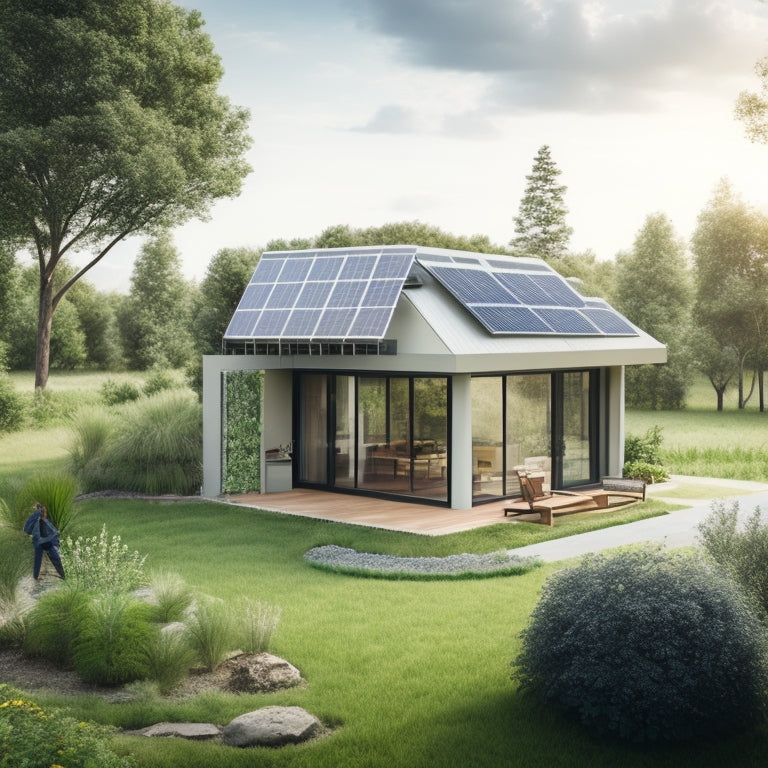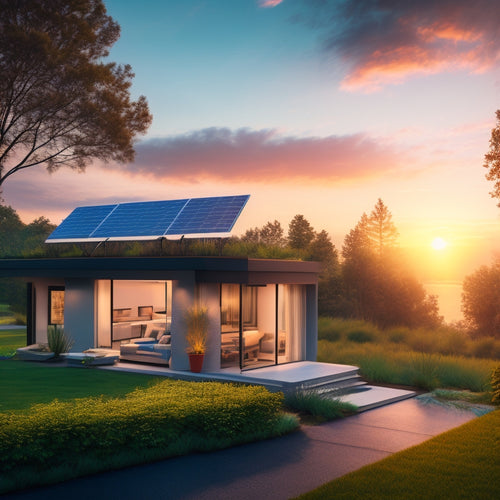
7 Tips for Home Energy Independence
Share
By taking control of your energy usage, you can greatly reduce your reliance on the grid and lower your electricity bills. Start by evaluating your energy usage through audits and calculating your daily consumption in watt-hours. Invest in solar power systems, optimized insulation, and energy storage solutions to generate and store your own energy. Implement smart home automation and monitor your consumption patterns to identify areas for improvement. Additionally, reduce energy waste through behavioral changes and efficient appliances. By combining these strategies, you'll be well on your way to achieving home energy independence - and there's more to investigate to maximize your energy freedom.
Overview
- Conduct energy audits to identify inefficiencies and track progress towards energy independence.
- Invest in solar power systems to reduce grid reliance and lower electricity bills.
- Optimize home insulation efficiency by selecting appropriate materials and ensuring correct installation.
- Implement smart home automation to adapt to energy needs, reducing energy waste and enhancing flexibility.
- Monitor energy consumption patterns with smart meters or whole-home monitoring systems to identify areas for improvement.
Assess Your Energy Usage
You need to understand how energy is being used in your home to achieve energy independence. Conducting an energy audit helps you identify areas of inefficiency and opportunities for improvement.
This detailed assessment evaluates your home's energy usage, providing a clear illustration of your energy consumption patterns. Calculate your total energy consumption in watt-hours (Wh) per day review past utility bills to get an accurate representation of your energy needs.
By establishing usage benchmarks, you'll be able to track your progress and make data-driven decisions to reduce your energy dependence. A thorough energy audit will examine factors such as insulation, windows, lighting, and appliances to identify energy-wasting culprits.
With this useful information, you'll be equipped to make targeted improvements, optimizing your energy usage and moving closer to the freedom of energy independence.
Invest in Solar Power Systems
Most households can considerably reduce their reliance on the grid by investing in solar power systems. When considering solar power, you'll need to decide on the type of solar panel that suits your needs. There are two main types: monocrystalline and polycrystalline. Monocrystalline panels are more efficient but also more expensive, while polycrystalline panels are more affordable but less efficient.
| Solar Panel Type | Installation Cost |
|---|---|
| Monocrystalline | $2.50 - $3.50 per watt |
| Polycrystalline | $2.00 - $3.00 per watt |
| Thin-Film | $1.50 - $2.50 per watt |
| Bifacial | $2.50 - $4.00 per watt |
| Concentrated PV | $3.00 - $5.00 per watt |
Keep in mind that installation costs vary depending on the panel type, system size, and installation company. Research and compare prices to find the best option for your energy independence goals.
Optimize Home Insulation Efficiency
Proper insulation is key to maintaining a consistent indoor temperature, thereby reducing your reliance on heating and cooling systems. You can achieve this by selecting the right insulation materials and installing them correctly.
Confirm your home has a thorough thermal barrier by air sealing gaps and cracks in the building envelope. Consider conducting an energy audit to identify areas that require insulation upgrades.
Assessing energy needs is vital in determining the effectiveness of your insulation. By understanding your daily energy consumption, you can optimize your insulation to minimize heat loss and energy waste.
Moisture control is also essential, as it helps prevent heat loss and damage to insulation. By optimizing your home's insulation efficiency, you'll be able to regulate the temperature more effectively, reducing your energy consumption and dependence on public utilities.
This step is fundamental in your path towards home energy independence.
Leverage Energy Storage Solutions
Optimizing insulation efficiency is just the first step towards home energy independence.
To further reduce your reliance on the grid, you'll need to utilize energy storage solutions. This involves integrating battery technologies into your home's energy system. By storing excess energy generated from renewable sources like solar or wind, you can power your home when the sun isn't shining or the wind isn't blowing.
Achieving grid independence energy freedom provides uninterrupted power during outages, and financial savings result from reduced grid reliance and lower bills.
Renewable integration allows you to maximize your energy independence, reducing your reliance on the grid and lowering your energy bills.
With the right energy storage solution, you can enjoy a steady supply of clean energy, no matter the weather.
Implement Smart Home Automation
Your smart home is only as efficient as its ability to adapt to your energy needs. To achieve true home energy independence, you need a system that can learn your habits and adjust accordingly.
Implementing smart home automation is key to revealing this potential. By installing a smart thermostat, you can reap benefits such as optimized temperature control, reduced energy waste, and even remote access.
Automated lighting control is another vital aspect, allowing you to schedule and adjust lighting levels based on the time of day, occupancy, and natural light availability.
With smart home automation, you'll be able to create a customized energy management system that responds to your unique needs, giving you the freedom and flexibility you desire.
Monitor Energy Consumption Patterns
As you've taken steps to automate your home, you're now prepared to gain a deeper understanding of your energy consumption habits.
Monitoring your energy consumption patterns is essential for achieving home energy independence. You'll need to track your energy usage to identify areas of inefficiency. Invest in a smart energy meter or a whole-home energy monitoring system to collect data on your energy consumption.
This will provide you with real-time energy tracking and consumption analysis. By analyzing your energy usage patterns, you'll be able to pinpoint opportunities to optimize your energy consumption, reduce your reliance on the grid, and take a significant step towards energy independence.
Reduce Energy Waste Effectively
With a clear image of your energy consumption patterns in hand, it's time to tackle the often-overlooked culprit of energy waste. Conducting energy audits will help you identify areas where energy is being wasted, such as inefficient lighting or insulation.
By pinpointing these areas, you can make targeted behavioral changes to reduce waste. For instance, switching to energy-efficient light bulbs or sealing air leaks can make a significant impact.
Furthermore, simple changes like turning off appliances when not in use or adjusting your thermostat can also contribute to reducing energy waste.
Frequently Asked Questions
Can I Generate Energy Independence With a Small Solar Panel System?
You can achieve energy independence with a small solar panel system, but you'll need to contemplate solar panel efficiency and optimize your system's performance to support off-grid living, ensuring you're generating enough power to meet your daily needs.
How Long Does It Take to Recoup the Cost of Energy-Efficient Upgrades?
Like Odysseus returning home, you'll want to chart your course to energy independence. When upgrading, you'll find the payback period varies; however, with benefits like reduced bills and increased property value, you'll recoup costs in no time, breaking free from the grid's grasp.
Are DIY Energy Audits a Reliable Way to Assess Energy Usage?
You can conduct a DIY assessment to identify areas for energy efficiency, but it's crucial to recognize that a professional audit provides more accurate results, ensuring you're not missing critical opportunities for improvement.
Can Energy Storage Solutions Power My Entire Home During an Outage?
Crafting a catastrophe-free comfort zone, you carefully consider energy storage solutions. With sufficient battery capacity, you can power your entire home during an outage, as long as the outage duration doesn't outlast your battery's capabilities.
Will Energy Independence Increase My Property's Resale Value?
You'll likely see an increase in your property's resale value as energy independence becomes a coveted asset; a recent property appraisal will reflect this, aligning with market trends that prioritize sustainable, self-sufficient homes.
Ready to Buy
You're on the cusp of breaking free from the shackles of energy dependence! With these 7 tips, you'll be generating, storing, and optimizing energy like a pro. Imagine a future where your home is a self-sustaining powerhouse, churning out clean energy and saving you a small fortune. The grid will be a distant memory as you bask in the glory of energy independence. You'll be the envy of the neighborhood, a symbol of sustainability in a world still chained to fossil fuels. The future is now - seize it!
Related Posts
-

Smart Home Thermostats to Revolutionize Your Space
Smart home thermostats revolutionize your space by providing precise temperature control and optimizing energy saving...
-

Top 10 Off Grid Camping Gear Must-Haves
When you're off-grid camping, the right gear is crucial for a smooth expedition. Start with a durable, weather-resist...
-

The Future of Residential Energy Storage
The future of residential energy storage looks promising and cost-effective for you. With lithium-ion battery prices ...


